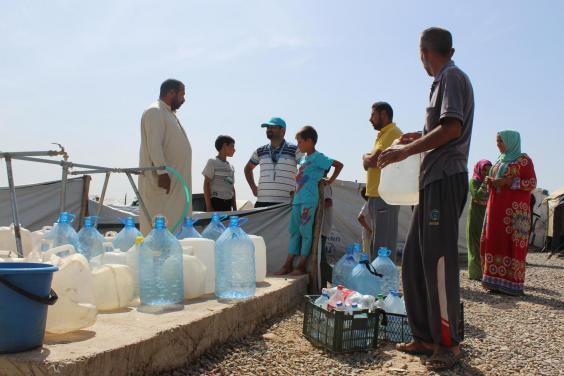Iraqi government employees given day off work as summer temperatures soar to 50C
Temperatures in Baghdad reach a sweltering 50C while heatwave conditions pose severe dangers for people fleeing fighting with Isis in the north of the country

Your support helps us to tell the story
From reproductive rights to climate change to Big Tech, The Independent is on the ground when the story is developing. Whether it's investigating the financials of Elon Musk's pro-Trump PAC or producing our latest documentary, 'The A Word', which shines a light on the American women fighting for reproductive rights, we know how important it is to parse out the facts from the messaging.
At such a critical moment in US history, we need reporters on the ground. Your donation allows us to keep sending journalists to speak to both sides of the story.
The Independent is trusted by Americans across the entire political spectrum. And unlike many other quality news outlets, we choose not to lock Americans out of our reporting and analysis with paywalls. We believe quality journalism should be available to everyone, paid for by those who can afford it.
Your support makes all the difference.All state employees in Iraq were given a day off on Thursday as an extreme summer heatwave gripped the country.
Temperatures in the capital of Baghdad reached 50C by midday, and around 48-49C in other major cities such as Mosul in the north and Basra in the south.
While searing heat is a part of every Middle Eastern summer, an issue from Prime Minister Haider al-Abadi’s office said that government workers were not expected to come into work because of the exceptionally brutal conditions.
Heatwaves in Iraq normally knock out power supplies. On Thursday many people on social media reported that their electricity or air conditioning had stopped working for hours at a time.
The country broke heat records in 2016: last July, Basra - at 54C - became the hottest place on earth outside Death Valley. At the time Baghdad declare a mandatory four-day holiday to help people cope.
The conditions in Iraq this year are impacting the fight to drive the last Isis militants from the country following their defeat in Mosul in June.
The fighters cling on in Hawija and Anbar, driving internally displaced people to flee fighting every day.
New arrivals often reach camps after walking for hours, dodging Isis IEDs (improvised explosive devices), sniper and mortar fire – a journey even more dangerous while dehydrated under the scorching summer sun.
Southern Europe and Canada have also been affected by heatwaves which have caused devastating wildfires in the last month.
The 2017 increase in extreme weather is due to global warming, scientists say.
European Commission research released last week predicted that 150,000 people a year could die as a result of extreme weather events by 2100 if the world does not combat the effects of climate change.
Join our commenting forum
Join thought-provoking conversations, follow other Independent readers and see their replies
Comments